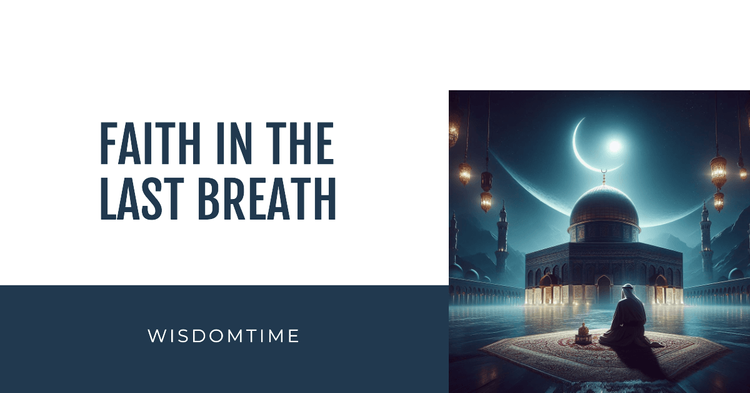
Faith in the Last Breath
Question: Can someone live a faithful life throughout their life but lose faith in the last breath? I remember reading something about living a faithful life until the end and then losing faith in the last breath. Is faith such a dynamic thing? If so, why is it not about general performance but about what happens in our last breath? Isn't this unfair?
Answer: What you read involves a correct concept being explained inaccurately and the out-of-context use of a hadith on another topic.
Faith is a form of belief that evolves and grows through time and effort, as a result of using one's will with the grace of Allah. It doesn't disappear suddenly. Although the declaration of the Shahada is something said in a short time, true belief is achieved after a long process. The settling and rooting of faith in the heart require a lot of good deeds, contemplation, and action.
What those writers wanted to convey by bringing up the concept of "having faith in the last breath" is explained through a different perspective. One of the human tendencies that harm individuals is the belief that what one currently possesses will be in their hands eternally. Because of this, a person falls into heedlessness, neglects what they should do, and ends up losing what they have. For instance, when someone is healthy, they may assume their health will last forever and neglect the necessary precautions to maintain it. This negligence leads to the loss of health.
Similarly, in the early stages of a relationship, a person may be attentive, speak gently, and act understandingly towards their intended spouse. However, after marriage, feeling secure, they may become rude and neglect personal care. Consequently, they may lose their spouse through divorce or experience a loss of peace and happiness in their marriage.
Indeed, feeling secure about one's current blessings and neglecting responsibilities leads to the loss or decline of those blessings. From this perspective, a person should not feel guaranteed about being faithful or maintaining faith. If they fail to do what is necessary to preserve and develop their faith, they should remember that they might lose their faith, even if not immediately, gradually over time.
The topic is brought up by emphasizing "having faith in the last breath" to highlight the truth they want to explain. It is not meant to imply that "all of life is meaningless, and one's reputation is only about the last breath," which would be a misunderstanding.
People asked Prophet Muhammad (peace be upon him): "What is the situation of a person who believes, then disbelieves, then believes again?" The Prophet (peace be upon him) replied, "One dies in the state in which one is at that moment, either as a believer or a disbeliever."
Without the context of the question, only the response of the Prophet (peace be upon him) is narrated. The concept of "believing at the moment of death" has become ingrained in culture, and even uttering "la ilaha illallah" in the last breath is considered very important. However, neither the Prophet (peace be upon him), nor the four caliphs, nor the known companions had their last words as the declaration of the Shahada.
To avoid any misunderstanding the phrase "la ilaha illallah" is always beautiful, whether uttered while alive or during death. Here, we attempted to explain the concepts of not feeling secure and the consideration of a person's final state, who may have changed religions several times.
Unfortunately, there are many things in our understanding of religion that are narrated by rote and have lost their meaning within tradition.
References:
-Surah Al-Hujurat, 14: https://www.kuranmeali.com/AyetKarsilastirma.php?sure=49&ayet=14
-Sahih al-Bukhari, Book 76, Hadith 577: https://sunnah.com/bukhari:6412
-Ibn Majah, Sunan, Book 1, Hadith 55.
